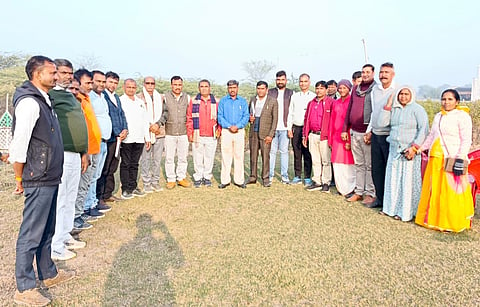
Jaipur- In Rajasthan, a disconcerting social practice persists within the Kanjar community, wherein brides are traded for monetary compensation. This practice, known as Chari Pratha, involves parents prefer marrying their daughters to suitors in lieu of money ranging from Rs 50,000 to Rs 10 lakh. This transactional approach, sanctioned by a caste panchayat, has led to social and economic disparities.
The alarming consequences are far-reaching, with many eligible boys within the community unable to afford these exorbitant prices. This has resulted in an estimated 3,000 marriageable boys from the community, remaining single in Rajasthan, painting a grim picture of the potential societal impact if the Chari system continues unabated. The Kanjar community holds a Scheduled Caste status in the state.
To address the issue, the state-level core committee of the Kanjar Samaj convened a meeting in Devli, Tonk, hosted by the Kanjar Samaj Mahapanchayat Mahasabha and Bijori Kanjari Welfare Foundation. In a decisive move, the committee resolved to compile a list of individuals known as Panch Patels, who are culpable for promoting and organizing the Chari Pratha. This list, highlighting those involved in supporting bride trading, prostitution and human trafficking, will be submitted to the government for necessary action.
Gyarasi Lal Gogawat, the State President of All Rajasthan Kanjar Samaj Mahapanchayat, shared details with The Mooknayak and illuminated the economic, social, educational, and political challenges faced by the Kanjar community. Notably, in regions such as Tonk, Bundi, Bhilwara, Sawai Madhopur, Alwar, and Bharatpur, girls and women from the community are predominantly engaged in prostitution due to a lack of permanent employment opportunities and economic backwardness.
To combat the societal repercussions of these practices, the organization is poised to launch awareness campaigns against child marriage, a prevalent issue linked to the broader Chari system. A reward of Rs 2100 has been announced for social workers providing information on child marriage incidents.
Ramhet Kesia, the State General Secretary, lamented the plight faced by the female members of the Kanjar community, emphasizing that they bear the brunt of societal evils, enduring a form of social enslavement.
Numerous incidents have surfaced, revealing a disturbing trend where certain individuals, through the dissemination of propaganda, engage in the reprehensible act of human trafficking, preying on the vulnerable members of the community.
Gyarasi Lal articulated the current status of the Kanjar community, describing it as a victim of discrimination. He highlighted the imperative need to foster unity within the society, striving to create an ideal community characterized by education, development, culture, and self-respect.
Lamentably, the lack of educational opportunities has hindered the Kanjar society from reaping the anticipated benefits of reservation policies. Merely 2 percent of the youth from the community have managed to secure advantages in government jobs.
Gyarasi Lal says, "At present, the Kanjar community is a victim of discrimination. There is a need to unite the society and create an ideal society by making it educated, developed, cultured, self-respecting, and by abandoning the prevailing evils in society. The core committee has decided to conduct a survey of all the boys and girls aged 0-18 years. Due to a lack of education, our society has not been able to obtain the expected benefits of reservation; hardly 2 percent of the youth from the society would have benefited in government jobs."
The historical context of the Kanjar community adds depth to the challenges they face. With a population of approximately ten to fifteen lakhs in Rajasthan and one crore in India, the community boasts a storied past marked by freedom-loving individuals who played a significant role in historical conflicts against the Mughals and the British.
Despite their historical contributions, discriminatory actions such as the imposition of the Criminal Tribes Act 1871, as a tribe "addicted to the systematic commission of non-bailable offenses" by the British government resulted in the Kanjar community being labelled as criminals without recourse, leading to their continued marginalization.
In response to economic, social, educational, and political backwardness, the Kanjar community has been advocating for the creation of a separate Bijori Kanjari Welfare Board. Members of this community have traditionally earned their livelihood through various activities such as sports, shows, entertainment, guarding, animal rearing, dancing during royal ceremonies, and displaying their art. However, in present times, these traditional means of livelihood have vanished. Nomadism prevented them from settling on land, and it was only after independence that a significant number began to settle permanently. Unfortunately, due to the prevailing caste system, the community has become further deprived and exploited.
Although the state government has established a Vimukt Nomadic Semi-Nomadic Caste Welfare Board, the Kanjar community has not received any special benefits so far. The community has long been urging for the creation of a dedicated board. Gogawat expressed that considering the economic, social, educational, and political backwardness of the society, a demand will be presented to the Rajasthan government to establish a separate Bijori Kanjari Welfare Board. This initiative aims to integrate the Kanjar community into the mainstream. He asserts, until this board is established, the community's struggle will persist.
Also Read-
You can also join our WhatsApp group to get premium and selected news of The Mooknayak on WhatsApp. Click here to join the WhatsApp group.